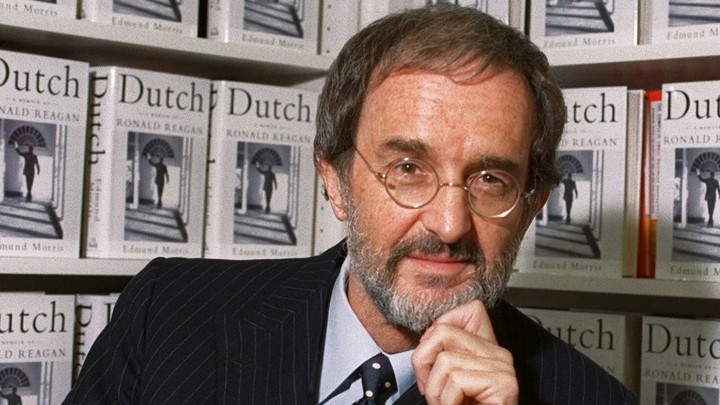The Tragedy of Edmund Morris
I often think of Edmund Morris, the master biographer who died this weekend at the age of 78, as the man whom Ronald Reagan, the subject of his most famous biography, drove crazy.
Reagan drove a lot of people crazy. Anyone who spent time in the faculty lounges and graduate seminars of the 1980s, as I did, can tell you all about it. You had to see it to believe it, the intensity of it, especially now that Reagan has been declawed into the kindly, unexpectedly shrewd, avuncular master of misdirection that we know from pop biographies and second-rate TV documentaries. Back then, though, the mere mention of his name could send professional eggheads, especially the ideological kind, into a scarlet fury. The dunce! Ignoramus! He’s gonna get us all killed!
The fury was unique for its time, but I suppose we’ve all gotten used to it, after the revulsion most Republicans felt toward Barack Obama, and the revulsion everyone else felt toward Donald Trump.
Reagan didn’t drive Morris crazy in that way, even metaphorically. Before and after his years with Reagan, Morris remained soft-spoken, cerebral, amused—only mildly eccentric. And unlike the Reagan-era eggheads, or the Obama- and Trump-haters of our own day, he didn’t have an ideological bone in his body.
He was more an artist than a historian or biographer. If you can get your hand on it, take a half hour to read the first chapter of the first volume of his biography of Theodore (never Teddy) Roosevelt, in which Morris follows the new president as he makes his rounds on Inauguration Day. There, as in all his work, he gives you sights and sounds, the glow of lamplight and the clop of horses in the street, and even, in a great feat of literary imagination, the rhythm of the thoughts that pulse through the heads of his subjects. In his Reagan biography, Morris’s descriptions of the settings of Reagan’s life—from the Illinois prairie of his boyhood, woebegone and terrifying, to the crisp, carpeted, air-cooled efficiency of the White House West Wing in the 1980s—are precise, accurate, and full of meaning. They are nearly perfect.
What Morris the biographer never gave you was politics, or ideas. This is strange, to put it mildly, in a writer who became famous as a biographer of politicians. T. S. Eliot wrote of Henry James, “He had a mind so fine no idea could violate it.” Eliot meant it as a compliment. Morris, to a lesser degree, deserves the same praise. Ideas, especially political ideas, are usually blunt and cumbersome things, large and crude enough to be expressed in quick strokes and grasped by masses of people, and they preoccupy those of us whose intellectual taste seldom runs to the delicate and subtle. Morris’s taste tended in the other direction, and so did his powers of observation. He watched or imagined the interplay between souls, the effect of power on personality, the subterranean drives of emotion and belief.
His account of Roosevelt’s reaction to the death of his first wife, for example, is at once clinically detached and deeply felt, and no biographer I know of could have recreated those moments with such sensitivity. Politics, though, is another matter. In the same volume, Morris has a rounded account of the political career of Roosevelt’s rival William Jennings Bryan, and somehow scarcely mentions the debate over free silver, the issue that defined Bryan’s career. This is the difference between the historian and the artist: The historian will sit still for monetary policy.
Reagan, his wife, and his advisers were so impressed with The Rise of Theodore Roosevelt that they didn’t notice this defect—if that’s what it was—in the biographer. They were in the market for a reputable historian to write a semi-authorized biography of the sitting president. They weren’t having much luck, given that so many “reputable” historians (see above) weren’t cut out for the job. All they knew was that Morris had written admiringly of a Republican, and they’d heard rumors that the historian himself had Republican leanings. A Republican with a Pulitzer Prize! When Morris, after some back-and-forth, agreed to tail Reagan around through his second term and use the material to shape a biography as he saw fit, the Reaganites were rather proud of their catch.
The result, Dutch: A Memoir of Reagan, is a famous, a legendary, an epochal disaster. This should have been entirely predictable. No one, before Morris or after, had ever been able to penetrate Reagan’s lacquered shell of geniality. Beyond his wife, he had no intimates. Those who worked most closely with him resorted to oxymoron when describing him. Reagan, said James Baker, was “the kindest and most impersonal man” he’d ever met. Another subordinate who idolized him, Martin Anderson, called him a “warmly ruthless man.”
“People who had worked for him much of their lives,” wrote his most dutiful biographer, Lou Cannon, “suspected that there was something beneath the surface they had never seen, but they did not know what the something was.”
Morris took it on himself to find the something—it was, he felt, his duty as a biographer and (though he wouldn’t have said it aloud) an artist. After all, the only journalist who could be said to have gotten close to Reagan—through his wife, Nancy—was George Will, who had said, “On the first nine levels, Reagan is the least interesting of men. But if you postulate a tenth level, then he’s suddenly fascinating.”
Ready to be fascinated, Morris took advantage of unprecedented access to his subject. He sat as a fly on the wall during momentous White House meetings, taking notes with his Montblanc in a tiny, elegant script, and interviewed his subject for hundreds of hours as the second half of the Reagan tenure unfolded—a more consequential four years than the presidency had seen in a generation. Everyone he wanted to talk to, talked to him.
And he came up … empty. Well, not empty. Dutch is full of beautiful writing and insight about nearly everything Reagan encountered in a long and eventful life. (Reagan was 75 when Morris, then in his mid-forties, began to tag along.) But about the man himself—the lacquer never cracked, the Reagan twinkle never dimmed to reveal what, if anything, was behind it. Reagan, Morris said years later, “is the strangest man who ever lived.”
From a biographer, from an artist, this is a cry of the heart. It means: I give up! I can’t figure him out! There was no tenth level. Reagan was a purely political creature, all the way down, and to his biographer, with no ear for politics and in search of depths to plumb, he remained incomprehensible to the end.
As a way around the wall he’d been butting his head against, Morris invented a now notorious literary device. Note the word memoir in the subtitle. Instead of postulating that tenth level, he imagined himself, Edmund Morris, as a contemporary of Reagan’s, and wove himself in and out of his account of Reagan’s life, from small-town Illinois to Hollywood to the West Wing. In flashbacks, it transpires that Reagan, as a young lifeguard, had once saved young Edmund from drowning. That heroic act then becomes a metaphor for Reagan’s rescuing of the West from the swirling eddies of Communism in the Cold War.
The metaphor is strained enough. Morris never publicly worried that his fictional passages—he even invented footnotes for them!—rendered the rest of his work worthless as serious biography. The reputable historians were outraged over the squandering of priceless access and resources, and Reagan’s legions of fans seethed over what they saw as an exercise in triviality. These never bothered him either, at least not publicly. The artist won out over the biographer.
Morris entrusted a mutual friend with the privilege of reading the manuscript of Dutch as he finished it, chapter by chapter. As the final crazy pages unspooled from his fax machine late one night, my friend later told me, “I realized it had to be one of two things. Either Edmund had reached new heights of literary genius, or Reagan had driven him nuts.”
Both things could be true, of course. In the years after Dutch, Morris continued to produce work of high literary and historical merit, including dozens of essays, the final two volumes of his biography of Roosevelt, and a book-length appreciation of Beethoven. A biography of Thomas Edison, the obituaries tell us, is due this fall. The insanity was only temporary.


No comments:
Post a Comment